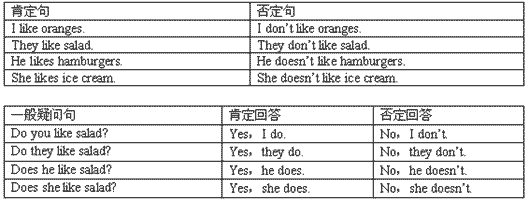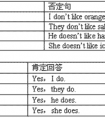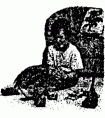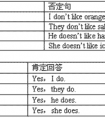Chooseandcorrect. 选出错误的一项,并在横线上改正过来。1.Iwillsendthreepostcard.A B C2.Doyouknowwherethepostofficeare?AB C3.Iwanttosendthise-mailformydadand-五年级英语
第一人称单数形式,用am
第三人称单数形式,用is
第一人称复数、第二人称、第三人称的复数形式,则用are
一般将来时:
will be
一般时态有关be动词的口诀:
我用am,你用are,is连接他/她/它,复数形式就用are
be动词的用法:
现在时 I am, you are, he is, we are, you are, they are
(缩略式 I'm, you're, he's, we're, you're, they're),
(否定缩略式 I'm not, isn't, aren't),
过去时 I was, you were, he was, we were, you were, they were
(过去时否定缩略式 wasn't, weren't),
过去分词been,现在分词being
英语的“be”是个特殊动词;有些语言,如马来文等,并没有“be”这样的动词。
“Be”除了原形的“be”之外,还有另外七种形式:
am, is, are, been, being, was, were.
在句子中,“be”可以是主动词(The Principal Verb)或助动词(The Auxiliary Verb)
一、口诀:
我用am,你用are,is连着他,她,它;
单数名词用is,复数名词全用are;
变疑问,往前提,句末问号某丢弃;
变否定,更容易,be后莫忘记;
疑问否定任你变,句首大写莫迟疑。
二、Be动词在一般过去时中的变化:
1、am和is在一般过去时中变为was;
2、are在一般过去时中变为were
3、带有was或were的句子,其否定、疑问的变化和am is are一样,即否定句在was或were后加 not,一般疑问句把was或were调到句首。
考点名称:一般现在时,动词单数第三人称
一般现在时:
表示现在经常反复发生的动作、存在的状态或习惯性的动作的时态。可概括为
①经常性或习惯性动作;
②长期存在的特征或状态;
③普遍真理、客观事实等。
构成:
一般现在时用行为动词的原形,但第三人称单数作主语时,动词的词尾要加-S。
a. 表示经常性或习惯性的动作。
例:Li Ming always helps the old man. 李明一直帮助这位老人。
We usually go to school on foot. 我们通常步行上学。
They sometimes go fishing on Sundays. 他们有时周日去钓鱼。
b. 表示永恒不变的事实或真理。
例:A bird flies with wings. 鸟用翅膀飞翔。
c. 用在格言、谚语中。
例:Pride goes before a fall. 骄者必败。- 一般现在时具体用法:
1.表示经常的或习惯性的动作,常与表示频率的时间状语连用。
时间状语:
always,usually,every morning/night/evening/day/week/year,often,sometimes,
occasionally,from time to time,twice a week,rarely,seldom,once a month,hardly,ever,never.
e.g: I leave home for school at 7:00 every morning.
2.表示主语具备的性格、能力、特征和状态。
e.g:I don't want so much.
Ann Wang writes good English but does not speak well.
比较:Now I put the sugar in the cup.
I am doing my homework now.
3.表示客观事实和普遍真理。
e.g :The earth moves around the sun.
Shanghai lives in the east of China.
4.在时间状语从句和条件状语从句中,常用一般现在时代替将来时。
5.表示预先计划或安排好的行为。
6.小说故事用一般现在时代替一般过去时。新闻报道类的内容,为了体现其“新鲜”性,也用一般现在时来表示过去发生的事情。
7.有些表示状态和感觉的动词表示现在发生的具体行为时,只用一般现在时,而不用进行时态。
8.表示现在发生的具体动作或存在的状态
9表示格言或警句中。 e.g Pride goes before a fall. 骄者必败。
注意:此用法如果出现在宾语从句中,即使主句是过去时,从句谓语也要用一般现在时。
例:Columbus proved that the earth is round..
第一句用一般现在时,用于操作演示或指导说明的示范性动作,表示言行的瞬间动作。
再如:Now watch me,I switch on the current and stand back.
第二句中的now是进行时的标志,表示正在进行的动作的客观状况,所以后句用一般现在时。 - 一般现在时用法表:

第三人称单数的构成见下表:
不规则变化have和be动词 变have为has 变be为am,is,are例: have-has; be-am,is,are词
构成
举例
一般情况
词尾+s
动词原形
第三人称单数
work(工作)
stop(停止)works
stops以-ch, -sh, s, x, o结尾
词尾+es
teach(教)
wash(洗)
dress(装扮)
fix(安装)
go(去)teaches
washes
dresses
fixes
goes以“辅音字母+y”结尾
变y为i,再加es
fly(飞翔)
try(尝试)flies
tries 一般现在时的特殊用法:
一些动词可用一般现在时来表达现在进行时:
verbs of the senses: hear,see,taste,smell,feel
verbs of the thinking: believe,know,mean,realize,think,remember
verbs of the linking: dislike,fear,heat,like,love,want
verbs of the possession: belong,have,own,possess
考点名称:特殊疑问句
- 特殊疑问句:
以特殊疑问词开头,对句中某一成分提问的句子叫特殊疑问句。
常用的疑问词有:what、who、whose、which、when、where、how、why等。
特殊疑问句往往是就其中的某一成分,进行提问,而且根据情况直接回答,不能用yes或no简单回答。
常见的疑问代词有who, whose, which, what;疑问副词有when, where, why, how。
例:What do you do on Sunday? 你周日的时候干什么?
Which class are you in? 你在哪个班?
Where does Mr. Li live? 李先生住在哪?
Why are you late? 你为什么迟到? 特殊疑问句的构成:
一、 特殊的疑问词。
特殊疑问句要由疑问代词或疑问副词开头,询问的内容不同, 使用的疑问词也不同。
我们学过的疑问词有:
what(询问事物), how much(询问价格),what time (询问时间,尤其是点钟), what kind of(询问种类),why(询问原因),who(询问人), where(询问地点) 等等。如:
—What is this? 这是什么?
—It's a key. 这是一把钥匙。
—How much is it? 这个多少钱?
—It's twenty dollars. 二十美元。
—What kind of movies do you like? 你喜欢哪一类型的电影?
—I like action movies. 我喜欢动作片。
- 最新内容
- 相关内容
- 网友推荐
- 图文推荐
| [家长教育] 孩子为什么会和父母感情疏离? (2019-07-14) |
| [教师分享] 给远方姐姐的一封信 (2018-11-07) |
| [教师分享] 伸缩门 (2018-11-07) |
| [教师分享] 回家乡 (2018-11-07) |
| [教师分享] 是风味也是人间 (2018-11-07) |
| [教师分享] 一句格言的启示 (2018-11-07) |
| [教师分享] 无规矩不成方圆 (2018-11-07) |
| [教师分享] 第十届全国教育名家论坛有感(二) (2018-11-07) |
| [教师分享] 贪玩的小狗 (2018-11-07) |
| [教师分享] 未命名文章 (2018-11-07) |





![Therabbitlikes_________.[ ]A.bonesB.chickenC.fishD.vegetables-四年级英语](http://www.00-edu.com/d/file/ks/4/1/9/2019-08-12/small19d909f6c152d7dbd99050270d09dd701565564237.gif)
